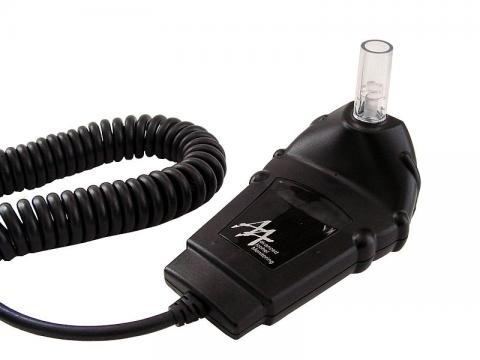
Penalties for DWI convictions in Texas depend on the age of the impaired driver, the blood alcohol content of the impaired driver at time of the arrest, whether any people were injured or property damaged, whether the impaired driver voluntarily submitted to chemical tests – like a breathalyzer or blood test – as requested by law enforcement officials, and prior criminal convictions, especially if it involves a DWI alcohol or drug crimes.
People convicted of DWI offenses in Texas can expect any or all of the following penalties:
- Fines and surcharges including court costs;
- Loss of drivers’ license and driving privileges;
- Probation;
- Attorneys’ fees;
- Imprisonment;
- Attendance at DWI education and intervention programs; and
- Requirement to install an ignition interlock device (IID).
What is an Ignition Interlock Device?
Many states, Texas included, require people convicted of certain DWI crimes to install an ignition interlock device (IID) in their vehicle in order to drive following a DWI arrest or conviction. Before IIDs were introduced as an option, drivers arrested or convicted of DWI crimes faced a period of time with a suspended or revoked driver’s license periods.
Driving privileges were restored on a conditional basis and limited to driving to school, work, court, or medical appointments only.
IIDs prevent vehicles from starting if the driver has been drinking. Like a breathalyzer, IIDs measure the amount of alcohol in a person’s system. If the amount of alcohol in a person’s system exceeds a preset level, the vehicle will not start. The idea behind the IID is to prevent people from driving under the influence of alcohol and harming themselves. A reading above the preset level opens the driver up to additional or harsher penalties in order to clear up the original DWI action.
What Happens to The Test Results?
The IID collects the breath samples and transmits them to the court, DMV, the probation officer, or any other personnel designated by the court. The collected samples may be transmitted real time, weekly, monthly, or at random. The test results get reviewed during supervision meetings with probation officers and may form the basis of a violation of probation condition charge if the readings are consistently above the preset limits.
Check back next week for additional posts on IID and IID related topics in Texas.
Hire a Texas DWI Defense Attorney
Every DWI case is unique. The fact-specific circumstances of the charges and how the law may be applied to your case are some of the immediate inquiries a Texas DWI defense lawyer will make. Make sure you select an attorney that you feel comfortable with, who will advise and counsel you on the steps you will undertake to resolve your DWI. From arrest to arraignment, to trial and post-conviction, the Law Office of Kimberly Griffin Tucker proudly serves the counties of Denton, Collins, and Dallas. Schedule your confidential DWI case evaluation today by calling (214) 445-6336 without further delay.
(image courtesy of Rsheram)
